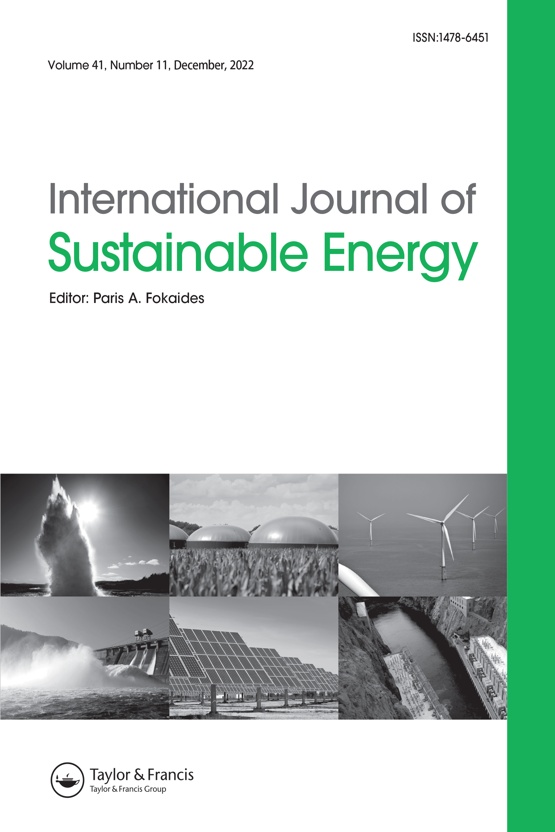Submit a Manuscript to the Journal
International Journal of Sustainable Energy
For an Article Collection on
Characterization, Modelling, Control, and Aging of Electrolyzers
Manuscript deadline
30 November 2024


Article collection guest advisor(s)
Prof. Dr. Damien Guilbert,
Université Le Havre Normandie, France
Characterization, Modelling, Control, and Aging of Electrolyzers
The water electrolysis process involves exploiting electricity derived from low-carbon power sources and pure water (the use of seawater is also considered but remains problematic) to make clean hydrogen that can be used to store energy, supply fuel cells for electricity generation in transportation, for industrial/commercial/residential buildings, and for power-to-X applications such as the generation of green gas.
The water electrolysis process is made possible thanks to the use of electrolyzers. Currently, four electrolyzer technologies have been reported in the literature, depending on their electrolyte material and ionic species they transport: alkaline water electrolysis, proton exchange membrane (PEM) water electrolysis, solid oxide (SO) water electrolysis, and the recently-introduced anion exchange membrane (AEM) water electrolysis. Among these four technologies, only alkaline, PEM, and AEM electrolyzers have reached a commercial stage. However, there remain some challenging issues in terms of modelling, control, and aging.
When coupled with intermittent renewable power sources and power electronics, electrolyzers can be subjected to material and component degradation leading up to a decrease in their performance. For this reason, it is crucial to have an improved understanding of their behaviours and stack degradation mechanisms because of dynamic operating conditions and current ripple from power electronics. Mitigation strategies are therefore needed to optimize the performance of electrolyzers and their durability. Furthermore, due to the possibility of degradation during their operation, it is crucial to design and develop electrolyzer emulators, which can be used to test new power electronics topologies and control without damaging a real electrolyzer. Finally, in electrolyzers, the membrane electrode assembly (MEA) can be subjected to different failures such as membrane break, internal gas leakage, cell flooding or drying, and poisoning of the catalyst areas. Only by enhancing electrolyzer technologies might hydrogen be introduced as a safe and sustainable energy carrier.
This Article Collection aims to attract original high-quality papers and review articles focused on electrolyzers, related to their characterization, modelling, control, aging, failure diagnosis, and faulty operation management.
Prospective authors may submit contributions dealing with (but not limited to) the following subtopics:
- Characterization and modelling of electrolyzers under dynamic operating conditions when coupling with intermittent renewable power sources
- Design and development of electrolyzer emulators
- Power electronics topologies and their control
- Impacts of dynamic operating conditions on the materials and components degradation of electrolyzers
- The impact of operating conditions (temperature, pressure, current density) and power electronics (current ripple) on the aging of electrolyzers
- Failure mechanisms in electrolyzers
- Development of failure diagnosis methods
- Development of faulty operation management to enhance system performance
All manuscripts submitted to this Article Collection will undergo a full peer-review; the Guest Advisor for this Collection will not be handling the manuscripts (unless they are an Editorial Board member).
Please review the journal scope and author submission instructions prior to submitting a manuscript.
The deadline for submitting manuscripts is 30 November 2024
Please contact Alex Johnson at [email protected] with any queries and discount codes regarding this Article Collection.
Please be sure to select the appropriate Article Collection from the drop-down menu in the submission system.
Article Collection Guest Advisor
Since 2023, Prof. Dr. Damien Guilbert has been full professor at Université Le Havre Normandie (France) and a permanent member of Group of Research in Electrical engineering and Automatic control of Le Havre (GREAH). His current research interests are: aging, modeling and emulation of electrolyzer (alkaline, PEM, AEM), power electronics, hydrogen for transportation applications (automotive, ships), and energy management of multi-source systems considering intermittent energy sources and hydrogen technologies (electrolyzer, storage, fuel cell).
Benefits of publishing open access within Taylor & Francis
Global marketing and publicity, ensuring your research reaches the people you want it to.
Article Collections bring together the latest research on hot topics from influential researchers across the globe.
Rigorous peer review for every open access article.
Rapid online publication allowing you to share your work quickly.
Looking to Publish your Research?
Find out how to publish your research open access with Taylor & Francis Group.
Choose open accessSubmission Instructions
All manuscripts submitted to this Article Collection will undergo desk assessment and peer-review as part of our standard editorial process. Guest Advisors for this collection will not be involved in peer-reviewing manuscripts unless they are an existing member of the Editorial Board. Please review the journal Aims and Scope and author submission instructions prior to submitting a manuscript.